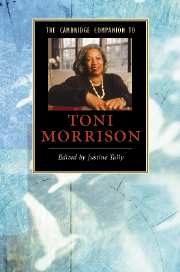Introduction: “All necks are on the line”
Published online by Cambridge University Press: 28 January 2008
Summary
In her seminal essay, “Unspeakable Things Unspoken: the Afro-American Presence in American Literature,” Toni Morrison throws down the gauntlet. What we do as writers and critics is not just important, it is crucial; it is not just informative, it is formative; it is not just interesting, it profoundly shapes the perception of the world as we, and others, come to “know” it. It is a responsibility that we as critics must take extremely seriously because what we do makes a difference, whether it is fawning over a popular writer whose subtext is actually pernicious to human relationships, or unfairly criticizing a more complex writer struggling to speak from a different world. The choices we make are not gratuitous; they are most often political, emerging from an ideology that we are not even, not necessarily anyway, aware of. If there is one thing that Toni Morrison - author, playwright, librettist, lyricist, Nobel Prize winner, social and literary critic - has taught us, it is that we are all responsible for those choices, and ignorance is not a lawful excuse for committing an infraction: For Morrison “. . . as far as the future is concerned, when one writes, as critic or as author, all necks are on the line.”
But as Morrison herself (following Bakhtin) has noted, “responsibility” is also “response-ability,” the capacity for a dialogue between writer and reading public, often mediated by the critic, which demands that (1) we take the author and her work seriously and meet her on her own terms, and (2) we prepare ourselves, yes, academically, but equally important, psychically to free our minds from the strictures and constraints of the inherited, the given, the unquestioned, the “unspeakable,” in order to meet “marginal” authors on their own terms.
- Type
- Chapter
- Information
- The Cambridge Companion to Toni Morrison , pp. 1 - 8Publisher: Cambridge University PressPrint publication year: 2007

